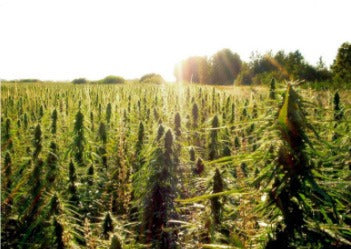Why Are Wax and Chlorophyll Removed From CBD Products?

At Joy Organics, we are passionate about using the whole plant when making broad and full spectrum hemp oil. Not only is this is a more sustainable practice, but it allows for additional nutrients to be present in the final product. The leaves, seeds and stems of hemp plants have distinct compounds that the others don’t have. This is what makes a leaf a leaf and a seed a seed.
When using the whole plant, there are some botanical elements that we choose to exclude. We extract plant matters such as chlorophyll and wax from Joy Organics CBD products. But, why are wax and chlorophyll removed from CBD products, if using the whole plant is preferred?
Let’s explain what these matters are, and why many natural health companies extract them from their formula.
What Is Plant Wax?
We’ll start with the less complicated of the two. Let’s use an example we’re all familiar with — smelly pits. If we know we’re going to get our sweat on, what’s one thing we do before hitting the gym? Hopefully, it’s put on some deodorant. Plant wax is much like our underarm wing-person.

The reason why we sweat so much under our arms is that when we workout, our body temperature goes up as well. Inside of this little cave of our armpit is the perfect crevice for moisture to build up. When we put deodorant (or essential oil sprays) under the arm, it creates a slick coating. This is sort of like a dome that will prevent moisture from going too crazy under there.
Now, let’s transition to the hemp plant. In its grow environment, the hemp plant also sweats. Under the intense heat of a lamp or the sun, plants secrete a wax. The wax will form a barrier around the cuticles. This is done as a means of survival for the plant.
As the light source attempts to draw moisture from the plant, hemp leaves try to protect the plant’s nutrients. Cannabis creates the wax to keep hold of its water source as long as possible. The wax acts as a water dome.
Why Remove Wax from CBD Products?
Plant wax actually has some benefits, but removing wax is a normal practice across many plant-based companies. Other companies will take the leftovers to create other products — most notably of the bunch is carnauba wax. With that being said, many other plant waxes are toxic, which is why other botanical companies may exclude them.
Thankfully, hemp wax is not known to be toxic. So, why would a company want to remove plant wax from their CBD products? The issues have more to do with the wax itself.

Wax has a consistency as its name suggests. Plant wax is a rather sticky substance. If you were to include plant wax in a formula such as CBD infused gummies, you would have to use a solvent to break the wax down. Otherwise, users wouldn’t be able to take the supplement properly. It would all stick together!
Breaking down the wax is almost pointless. When this happens, you start to lose some of the potent nutrients you would be hoping to preserve. Instead, the wax can be used in other ways that would maintain its integrity.
Now that you understand why plant wax is removed from CBD products, let’s get into a more complex topic. This one doesn’t involve armpits!
What Is Chlorophyll?
Chlorophyll is what gives hemp its green pigmentation. This molecule resides within little pods inside plant cells known as chloroplasts. These pods only live on mesophyll cells. Mesophyll cells can only be found on the interior of a hemp leaf.
Seeing as the leaf has chlorophyll, that means all hemp products (broad spectrum or not) must deal with this compound. If your product is not broad spectrum and has an overwhelming taste of the earth, then there’s a good chance there’s chlorophyll in there.

The purpose of mesophyll cells on the leaf’s interior is to feed the chlorophyll inside. As the sun beats down, chlorophyll draws that energy into the plant. From there, the sunlight is broken down into nutrients, and these minerals are dispersed to the areas that require vitamin-enrichment. Fun fact, thanks to chlorophyll, plants release oxygen back into the air for us to consume!
The amount of chlorophyll in a plant can be determined just by looking at it. If your plant is bursting with green like a leprechaun on Saint Patrick’s Day, that bad-boy is powered by chlorophyll. With that being said, chlorophyll alters the color of everything it touches. Note, chlorophyll would make a pungent dye for deep olive green fans out there!
Why Remove Chlorophyll from CBD Products?

There are health benefits to chlorophyll. These pigmentation cells have shown promise in repairing DNA cell damage. Studies also conclude chlorophyll exhibits anti-inflammatory capabilities. Due to these realizations, chlorophyll supplements are available in the health food market.
Again, why would CBD products opt to remove chlorophyll? Quite simply, it tastes pretty bad. Just as pungent of an olive green dye this compound would make, it makes for an even harsher flavor. No matter what you pair chlorophyll with, the scent of the earth will overpower the other components. This would not make for a pleasurable CBD experience!
How to Remove Chlorophyll and Wax from CBD Products
See, it’s nothing personal with chlorophyll and wax. They just don’t work for a good portion of the products that we (and many other CBD companies) carry. With that being said, we would like to explain how these plant materials are separated from the goodies we do preach about — phytocannabinoids!
To get phytocannabinoids is not an easy task. CBD products are formulated in sterile laboratories using expensive equipment and high-grade technology. In order to get plant material off a plant, you need to control the environment is in. That way, when you get the cannabinoids free from the wax and chlorophyll, you don’t lose the molecules into the atmosphere. The process of separating all of these elements is known as extraction.
What Is Extraction?
Sorry, ladies and gents, we’re going back to that armpit analogy for just a second! Whenever you apply pressure to something, it changes the composition of the object. Let’s take yourself for instance.
 You are running a mile. As you take off, you’re dry, breathing normally and smelling fancy fresh. Once the adrenaline pumps in, the game’s on. From there, your heartbeat increases, pushing more blood around. This causes your temperature to rise. Essentially, you’re cooking your fat.
You are running a mile. As you take off, you’re dry, breathing normally and smelling fancy fresh. Once the adrenaline pumps in, the game’s on. From there, your heartbeat increases, pushing more blood around. This causes your temperature to rise. Essentially, you’re cooking your fat.
So, what happens? Like an overboiled pot of pasta, you start to sweat. You are no longer that dry, normal-breathed, fancy-fresh runner of a mile ago. Sure, you’ll go back to the same person eventually, but under this stress, you changed your composition. You’re now panting, wet-skinned and not-so-fancy-fresh.
When formulating CBD products, this sort of logic is applied to hemp plants. Producers cause pressure to the plant. In the case of the hemp plant, this reaction results in the trichomes of the plant bursting. When this happens, CBD is released and collected. However, wax and chlorophyll also get caught up in the mixture. Therefore, they need to be separated as well.
There are two ways to extract wax and chlorophyll from hemp. Let’s take a look at the more complicated of the two first, CO2 extraction.
CO2 Extraction of Wax and Chlorophyll from CBD Products
Instead of making hemp run a mile, CBD companies like Joy Organics take a more scientific approach to extraction. Most companies use pressurized carbon dioxide to create stress on hemp. This is a non-toxic way of causing the trichomes to burst.
 Pressurized carbon dioxide is kept at subfreezing temperatures. It automatically freezes anything it comes into contact with, such as the hemp plant (and its molecules).
Pressurized carbon dioxide is kept at subfreezing temperatures. It automatically freezes anything it comes into contact with, such as the hemp plant (and its molecules).
Inside the controlled environment, the temperature slowly rises. By bringing up the temperature, frozen solid molecules start to become excited. This will allow the less-dense CBD, cannabinoids, wax and chlorophyll to bind to the heavy carbon molecules of the pressurized CO2. Eventually, the carbon is filtered out. In its wake is a bunch of hemp elements. From there, the plant material is sorted out carefully.
Ethanol Extraction of Chlorophyll and Cannabis
This is a much easier and faster way to strip unwanted components from your hemp products. The harsh vapors of the alcohol will cause the hemp trichomes to burst.
As this happens, phytochemicals get trapped in the environment they are in. From there, the ethanol is filtered out of the product. With that being said, it is possible for remnants of the ethanol to linger.
Please be aware of companies who use butane. This is a substance that is considered toxic. Also, check the label to make sure hexane wasn’t used. Hexane is a synthetic solvent. Therefore, it may alter the overall potency of your CBD products.
At Joy Organics, we make sure that plant matters like wax and chlorophyll are removed. We also isolate the THC so this cannabinoid doesn’t make it into our formula. In fact, lab test have found no detectable levels of THC in our products. In the end, you have broad spectrum hemp oil chock full of phytocannabinoids without the flavor of chlorophyll, the consistency of plant wax, or psychoactive elements of THC.
Still have questions about wax and chlorophyll being removed from CBD products? Please contact us today – our customer service team is ready to answer them!
Thanks for reading! To show how much we appreciate you, we’re going to give you 16% off your next order. Just use code READER16 at checkout!

Newsletter signup
Join the Joy Organics Family
Sign up and get updates on new products, as well as special coupons and discounts.
testimonials
What Our Clients Say
“This is a company that truly cares about its customers and providing the best CBD products currently available on the market.”










Join In On The Conversation
Your email address will not be published. Required fields are marked *
Comments will be approved before showing up.